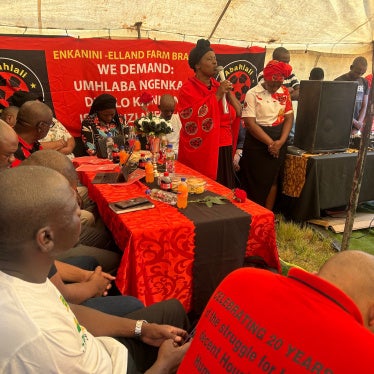Seventeen years ago this month, Eritrea’s government, led by President Isaias Afewerki, took draconian steps to quash all dissent.
That September, in 2001, Eritrean security forces arrested 11 of the 15 high-ranking government officials (the “G-15”) who had signed letters to the president complaining he was “acting without restraint, even illegally.” They called for the legislature to be convened regularly, as well as for elections and political parties – none of which had been permitted since Eritrea’s 1993 independence from Ethiopia. They asked that a Special Court, created by Isaias and reporting to him alone, be dismantled.
That same month, the government destroyed Eritrea’s independent press, arresting ten leading journalists, leaving government-run media as the sole domestic news source. All reporting on the G-15 complaints and other discontent with Isaias’s rule ended.
Since then, those officials and journalists, along with other political prisoners, have remained in incommunicado detention in a remote concentration camp called Eiraeiro. None have been brought to trial. The only one seen in public since 2002 is Dawit Isaac, a journalist who was admitted to the hospital in 2005. Reliable, if unconfirmed, reports say that over half of those detained have passed away while behind bars. An additional death, of former foreign minister Haile Woldensae, was reported in March.
Eritrea’s foreign minister, Osman Sahleh, said in 2016 that the prisoners are in “good hands,” but he presented no evidence for his claim. The prisoners would be tried, he said, “when the government decides.”
The G-15’s criticisms remain valid. Neither a legislature nor political parties exist in Eritrea. No national elections have occurred. Since 2002, Eritreans are subject to unlimited “national service” – time in the military or civil service. In practice, this means that young people are subjected to years—sometimes more than a decade—of forced labor, often under brutal conditions. People generally have no way of knowing when, or indeed if, their “service” will come to an end.
Isaias refuses to implement the constitution, approved in 1997, which restricts government power and confers basic rights on all. Ironically, in 1997, Isaias presented a paper while in England saying democracy included “the right to full respect and protection of one’s dignity; the right to unhindered movement and freedom of expression.”
The Isaias government should implement his own words of 30 years ago. It can begin by immediately releasing those imprisoned 17 years ago this month and the many other political prisoners in detention.










